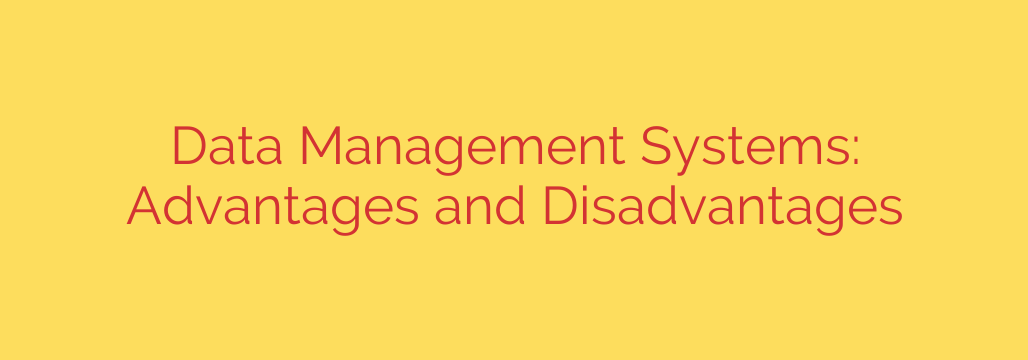
Unlocking Your Data’s Potential: The Pros and Cons of Data Management Systems
In today’s digital world, data is more than just information; it’s the lifeblood of your organization. From customer details and sales figures to operational metrics and marketing analytics, every decision you make is—or should be—backed by accurate data. The challenge is that this critical asset is often scattered across different spreadsheets, departments, and legacy applications, leading to inconsistency, security risks, and missed opportunities.
This is where a robust Data Management System (DMS) comes in. A DMS is a comprehensive solution—a combination of software, policies, and procedures—designed to help you store, organize, secure, and access your data efficiently. But is implementing one the right move for your business? Let’s explore the critical advantages and potential disadvantages to help you make an informed decision.
The Advantages: Gaining Control and Clarity
Implementing a proper DMS can transform how your business operates. By centralizing and standardizing your data, you unlock powerful benefits that can drive growth and efficiency.
Enhanced Data Security and Compliance: With all your data in a centralized system, you can implement uniform security protocols. A DMS allows you to control who can access, view, or modify specific data, creating a clear audit trail. This is crucial for protecting sensitive information and ensuring compliance with regulations like GDPR, CCPA, or HIPAA, significantly reducing the risk of costly data breaches.
Improved Data Consistency and Integrity: A DMS establishes a “single source of truth.” When data is updated in one place, that change is reflected across the entire organization. This eliminates data redundancy and the confusion caused by conflicting reports, ensuring that everyone—from sales to finance—is working with the same accurate and up-to-date information.
Faster, More Accurate Decision-Making: When your data is clean, organized, and easily accessible, your leadership team can generate accurate reports and gain valuable insights in real-time. A DMS empowers data-driven strategies, allowing you to spot market trends, understand customer behavior, and optimize operations with confidence.
Streamlined Data Sharing and Collaboration: Data silos are a major barrier to productivity. A DMS breaks down these walls by making it easy for different departments to share and access the information they need. This fosters better cross-functional collaboration, leading to more cohesive projects and a more agile organization.
Simplified Backup and Recovery: A quality DMS includes automated backup and recovery procedures. This provides a critical safety net against data loss due to hardware failure, human error, or a cyberattack. Instead of manually backing up dozens of disparate files, the system handles it, ensuring business continuity.
The Disadvantages: Navigating the Challenges
While the benefits are compelling, implementing a DMS is a significant undertaking that comes with its own set of challenges. It’s essential to consider these potential drawbacks before committing.
Significant Initial Cost and Complexity: A comprehensive DMS is a major investment. Costs can include software licenses, potential hardware upgrades to support the system, and professional services for implementation. The system’s complexity often requires careful planning and a steep learning curve for your team.
Requires Skilled Personnel to Manage: A DMS is not a “set it and forget it” solution. It requires ongoing maintenance, updates, and management by skilled IT professionals or a Database Administrator (DBA). If you don’t have this expertise in-house, you will need to factor in the cost of hiring or training staff.
Lengthy Implementation and Migration Times: Migrating your existing, scattered data into a new, centralized system is a meticulous and time-consuming process. This transition period can temporarily disrupt normal business operations and requires a detailed project plan to minimize friction.
Potential for a Single Point of Failure: While centralization has many benefits, it also means that if the central DMS fails, it could halt operations across the entire company. Mitigating this risk requires investing in robust redundancy, failover systems, and a rock-solid backup strategy, which can add to the overall cost and complexity.
Key Security Tips for Data Management
Whether you have a full-scale DMS or are working toward one, prioritizing data security is non-negotiable.
- Implement Role-Based Access Control (RBAC): Ensure employees can only access the data that is absolutely necessary for their job function.
- Enforce Strong Password Policies: Require complex passwords, multi-factor authentication (MFA), and regular password changes.
- Regularly Audit and Monitor Access: Keep logs of who accesses data and when. Regularly review these logs for any suspicious activity.
- Encrypt Sensitive Data: Both at rest (when stored on a server) and in transit (when being sent over a network), your most sensitive data should be encrypted.
The Verdict: Is a Data Management System Worth It?
For most growing businesses, the question isn’t if they need better data management, but how to best achieve it. A full-fledged Data Management System offers unparalleled control, security, and efficiency, but it demands a significant investment of time, money, and expertise.
The key is to conduct a thorough assessment of your organization’s specific needs, budget, and technical capabilities. When chosen and managed correctly, a DMS isn’t just an IT expense—it’s a strategic asset that fuels growth, mitigates risk, and provides a clear competitive advantage in a data-driven world.
Source: https://kifarunix.com/the-pros-and-cons-of-different-types-of-data-management-systems/








